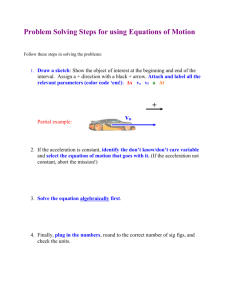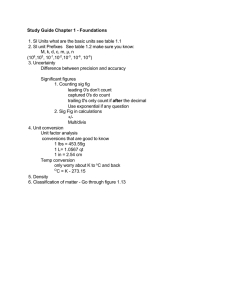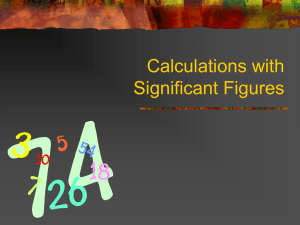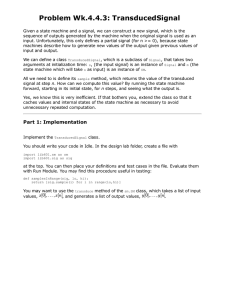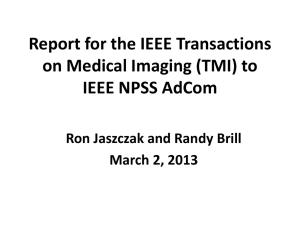FlexTM Flexible Decoupled Transactional Memory Support Arrvindh Shriraman
advertisement
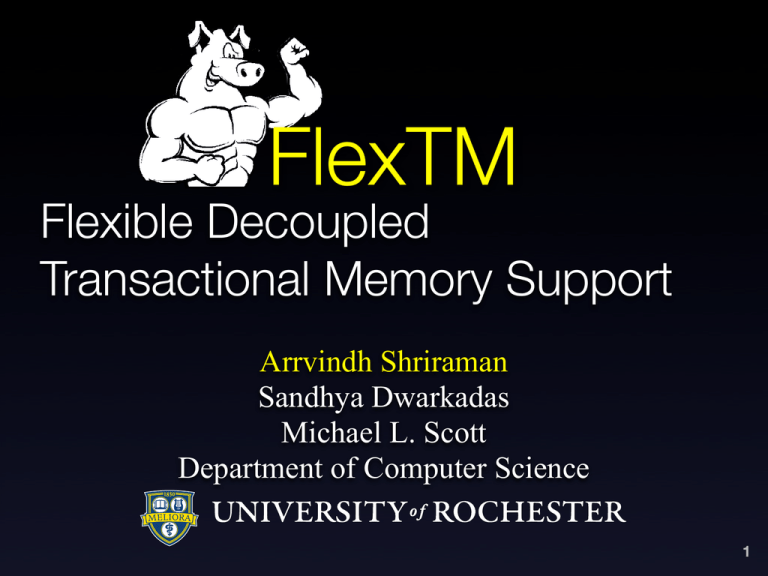
FlexTM
Flexible Decoupled
Transactional Memory Support
Arrvindh Shriraman
Sandhya Dwarkadas
Michael L. Scott
Department of Computer Science
1
Transactions: Our Goal
Lazy Txs (i.e., optimistic conflict resolution)
more concurrency
SW coordinates conflict management
when (i.e., eagerly or lazily)
how (i.e., stalling, who aborts)
Limitless Txs
Large: cache victimization and paging
Long: thread switches
2
Flexible Transactional Memory
100
Versioning
(Isolation)
STM (e.g., RSTM)
all software approach
Execution Time
80
60
Validation
(Consistency check)
40
Bookkeeping
(Metadata ops.)
20
Application
(Useful Work)
0
3
Flexible Transactional Memory
100
Versioning
(Isolation)
STM (e.g., RSTM)
all software approach
Execution Time
80
60
Validation
(Consistency check)
40
Bookkeeping
(Metadata ops.)
20
RTM [ISCA’ 07]
new cache states help bounded txs
software handles large & long txs
Application
(Useful Work)
0
3
Flexible Transactional Memory
100
Versioning
(Isolation)
STM (e.g., RSTM)
all software approach
Execution Time
80
60
Validation
(Consistency check)
40
Bookkeeping
(Metadata ops.)
20
0
RTM [ISCA’ 07]
new cache states help bounded txs
software handles large & long txs
FlexTM [this paper]
Good Performance
Application
(Useful Work)
No per-location software metadata
Simple hardware
No bulk arbiters like lazy HTMs
Allows software policy
3
Decoupled Hardware Primitives (1/2)
Separate interchangeable basic hardware ops.
that can be coordinated by software
Why ?
Minimizes hardware state
small footprint, simplifies virtualization
reduces development time
Software accessible
to build transactions & fine-tune policy decisions
to repurpose hardware for non-tx applications
4
Decoupled Hardware Primitives (2/2)
1. Data Isolation (delaying visibility of stores)
caches buffer speculative values, provide fast-commit
SW allocates overflow region & HW performs access
2. Access Summary (tracking locations accessed)
maintains list of locations read & written
check on coherence messages or local memory ops.
3. Conflict Summary (tracking data conflict events)
tracks conflict occurrence and type between processors
4. Alert-On-Update
monitor cache-blocks and trigger handlers
5
Outline
Preview
Data Isolation (aka. Lazy Versioning)
Lazy coherence
Overflow-Table
Conflict Management
FlexTM Software
Evaluation
Summary
6
Lazy Coherence (1/2): Approach
Lazy coherence:
permit multiple readers & writers for a cache block
restore coherence for multiple lines simultaneously
Current Research (e.g., TCC, Bulk)
bulk arbiters, bulk GetXs, bulk ops. on directory
Our approach: eager messages but lazy coherence
look out for sharer conflicts in standard coherence msgs.
continue caching data, but use T-MESI states
simple bit-clear ops. convert T-MESI to MESI
No bulk messages or address ops.
7
Lazy Coherence (2/2): Protocol
Two new ‘T’ tagged states: TMI (T+M) and TI (T+I)
TStores & TLoads denote speculative operations
ISA can include instructions or SW can tell HW the regions
TMI buffers TStores
e
r
o
t
TS
TMI
Commit
MESI
states
TL
Abort
TI
oa
TLoad /
~Threat
d/T
hre
at
+
+
TStore
allows multiple writers and readers
no data response but threaten
On commit, T+M => M
On abort, T+M =>T+I => I
TI caches threatened TLoads
cache remotely TStored block
On commit/abort, T+I => I
cached locations are accessed directly
bounded txs perform in-place update
8
Overflow Table
Challenge : Where to put evicted TMI lines?
Solution : Per-thread hash table (in virtual memory)
Hardware controller
fill table with TMI lines evicted from cache
removes table entries when reloaded into cache
performs look-aside transparently on L1 miss in parallel with L2
TMI WB /
L1 miss
Addr
Overflow-Table controller
80
current values
100
TAGS
80
120
Data
new values
Config. Sets,Ways Lookaside OSig
{80}
Base
100
per-thread
Overflow Table
9
Outline
Preview
Data Isolation (aka. Lazy Versioning)
Conflict Management (flexible)
Access summary signatures
Conflict table
Alert-On-Update
FlexTM Software
Evaluation
Summary
10
Access Summary (1/2): Signatures
Signatures [Bulk ISCA’06, LogTM-SE HPCA’07, SigTM ISCA’07]
Bloom filters to represent unbounded set of cache blocks
approx. representation with false positives
Cache block Addr.
hash1 hash2 hash3
0 0 1 0 0 0 0 0 0 0 0 1 0 0 0
Processor has two signatures:
Rsig (Wsig) summarizes locations TLoad (TStore)
Conflict Detection: Signatures snoop coherence messages
responder detects conflict and overloads response
requester picks response and resolves or notes conflict
11
Access Summary (2/2): Virtualization
[details in paper]
Required to handle long running txs & tx pauses
Challenge : How to detect conflicts with suspended txs ?
Solution : Read and Write summary signatures at the directory,
(note: does not affect cache hit critical path)
Details:
merge suspended txns signature with summary sig.
all L1 cache misses test signatures
if miss, no further action necessary
if hit, trap to software routine that mimics conflict HW
12
Conflict Tables: Tracking Conflicts
Current HTMs detect and resolve at the same time
Eager HTM systems perform both on a conflict
Lazy HTM systems perform both at commit time
Our approach: decouple detection from resolution
HW bitmaps record conflict event & expose to SW
SW decides when and how to resolve conflicts
Per-core conflict bitmap
Core-P’s table
R-W
W-W
W-R
Ncore bits
P’s read--remote write
P’s write--remote write
P’s write--remote read
Is there a conflict between P and core i ? Ans: Yes (1) / No (0)
13
Conflict Tables: Operation
4 core machine
C0
C1
Wsig:{}
Rsig:{}
W-W
Wsig:{A}
Rsig:{}
W-W
L2 Directory
A : M@C1
Either processor can resolve conflict prior to commit
If eager, requester resolves conflict immediately
Conflicter known, no central arbiter required
14
Conflict Tables: Operation
4 core machine
TStore A
C0
C1
Wsig:{}
Rsig:{}
W-W
Wsig:{A}
Rsig:{}
W-W
L2 Directory
A : M@C1
Either processor can resolve conflict prior to commit
If eager, requester resolves conflict immediately
Conflicter known, no central arbiter required
14
Conflict Tables: Operation
4 core machine
TStore A
C0
3Threat
W
Wsig
:{}
Rsig:{}
sig:{A}
W-W
1
C1
Wsig:{A}
Rsig:{}
W-W
1
2
Fw
d_
TG
ta
INV
K_
ET
X
4 AC
2 Da
X
ET
1 TG
L2 Directory
A : M@C1
M@C1,C0
Either processor can resolve conflict prior to commit
If eager, requester resolves conflict immediately
Conflicter known, no central arbiter required
14
Alert-On-Update (AOU) [ISCA’07]
Vector specific coherence or update events to the
processor in the form of a lightweight event/interrupt
on invalidation (capacity eviction or coherence)
on access/update (local event)
Aload/Arelease
A
Tag
Data
Ld
Add
......
Handler
Remote Store /
Eviction
15
Outline
Preview
Data Isolation (aka. Lazy Versioning)
Conflict Management (flexible)
FlexTM Software
FlexTM Transaction
Example
Evaluation
Summary
16
FlexTM Transaction (1/2)
Per-Tx descriptor
TSW
State
CMPC AbortPC
active / committed / aborted
running / suspended
handler for conflict table events | AOU events on TSW
FlexTM deploys
Signatures for detecting and notifying conflicts
Conflict Tables for tracking and managing conflicts
T-MESI for in-cache buffering and OT for cache overflows
AOU for propagating abort events to remote txs.
FlexTM software
checkpoints registers at Begin_Tx
manages conflicts; aborts remote tx by changing TSW
controls commit protocol routine
17
Lazy Transactions: Example
T1 Begin_Tx
L1
T2
abort_pc1
C0
L1
Wsig:{}
Rsig:{}
W-W
L2 Directory
Begin_Tx abort_pc2
C1
Wsig:{}
Rsig:{}
W-W
18
Lazy Transactions: Example
T1 Begin_Tx
T2
abort_pc1
ALD TSW0
L1
TSW0: AE
C0
Wsig:{}
Rsig:{}
W-W
Begin_Tx abort_pc2
ALD TSW1
C1
L1
TSW1: AE
L2 Directory
Wsig:{}
Rsig:{}
W-W
TSW0 : M@C0
TSW1 : M@C1
18
Lazy Transactions: Example
T1 Begin_Tx
T2
abort_pc1
ALD TSW0
TSt
Begin_Tx abort_pc2
ALD TSW1
A
C0
L1
A: TMI
TSW0: AE
W
Wsig
:{}
Rsig:{}
sig:{A}
W-W
A : M@C0
C1
L1
TSW1: AE
L2 Directory
Wsig:{}
Rsig:{}
W-W
TSW0 : M@C0
TSW1 : M@C1
18
Lazy Transactions: Example
T1 Begin_Tx
T2
abort_pc1
ALD TSW0
TSt
TSt
Begin_Tx abort_pc2
ALD TSW1
A
B
C0
L1
A: TMI
W
:{A}
:{}
Rsig:{}
WW
:{A,B}
sig
sig
sig
B: TMI
W-W
TSW0: AE
A : M@C0
B : M@C0
C1
L1
TSW1: AE
L2 Directory
Wsig:{}
Rsig:{}
W-W
TSW0 : M@C0
TSW1 : M@C1
18
Lazy Transactions: Example
T1 Begin_Tx
T2
abort_pc1
ALD TSW0
TSt
TSt
A
B
Begin_Tx abort_pc2
ALD TSW1
TSt
C0
L1
A: TMI
W
:{A}
:{}
Rsig:{}
WW
:{A,B}
sig
sig
sig
B: TMI
W-W
TSW0: AE
1
A : M@C0,C1
M@C0
B : M@C0
A
C1
L1
A: TMI
TSW1: AE
L2 Directory
W
Wsigsig:{A}
:{}
Rsig:{}
W-W
1
TSW0 : M@C0
TSW1 : M@C1
18
Lazy Transactions: Example
T1 Begin_Tx
T2
abort_pc1
ALD TSW0
TSt
TSt
A
B
Begin_Tx abort_pc2
ALD TSW1
TSt
TSt
C0
L1
A: TMI
W
:{A}
:{}
Rsig:{}
WW
:{A,B}
sig
sig
sig
B: TMI
W-W
TSW0: AE
1
A : M@C0,C1
M@C0
B : M@C0,C1
M@C0
A
B
C1
L1
A: TMI
:{A}
WW
W
:{A,B}
:{}
Rsig:{}
sig
sig
sig
B: TMI
W-W
TSW1: AE
1
L2 Directory
TSW0 : M@C0
TSW1 : M@C1
18
Lazy Transactions: Example
T1 Begin_Tx
T2
abort_pc1
ALD TSW0
TSt A
TSt B
Conflict & Commit protocol
Begin_Tx abort_pc2
ALD TSW1
TSt
TSt
A
B
For-each i set in W-R or W-W
CAS (Status[i], ACT, ABORT)
In software, decentralized, minimal overhead ∝ No. of conflicting Txs
C0
L1
A: TMI
W
:{A}
:{}
Rsig:{}
WW
:{A,B}
sig
sig
sig
B: TMI
W-W
TSW0: AE
1
A : M@C0,C1
M@C0
B : M@C0,C1
M@C0
L1
C1
A: TMI
:{A}
WW
W
:{A,B}
:{}
Rsig:{}
sig
sig
sig
B: TMI
W-W
TSW1: AE
1
L2 Directory
TSW0 : M@C0
TSW1 : M@C1
18
Lazy Transactions: Example
T1 Begin_Tx
T2
abort_pc1
ALD TSW0
Begin_Tx abort_pc2
ALD TSW1
TSt A
TSt B
Conflict & Commit protocol
TSt
TSt
For-each i set in W-R or W-W
Conflict Handler!
CAS (Status[i], ACT, ABORT)
A
B
In software, decentralized, minimal overhead ∝ No. of conflicting Txs
C0
L1
A: TMI
W
:{A}
:{}
Rsig:{}
WW
:{A,B}
sig
sig
sig
B: TMI
W-W
TSW0: AE
1
TSW1: M
A : M@C0,C1
M@C0
B : M@C0,C1
M@C0
L1
C1
A: TMI
:{A}
WW
W
:{A,B}
:{}
Rsig:{}
sig
sig
sig
B: TMI
W-W
TSW1: AE
1
L2 Directory
TSW0 : M@C0
TSW1 : M@C0
M@C1
18
Lazy Transactions: Example
T1 Begin_Tx
T2
abort_pc1
ALD TSW0
Begin_Tx abort_pc2
ALD TSW1
TSt A
TSt B
Conflict & Commit protocol
TSt
TSt
For-each i set in W-R or W-W
Conflict Handler!
CAS (Status[i], ACT, ABORT)
A
B
CAS-Commit Status[id]
In software, decentralized, minimal overhead ∝ No. of conflicting Txs
C0
L1
A:TMI
M
A:
W
:{A}
:{}
Rsig:{}
WW
:{A,B}
sig
sig
sig
B:
M
B: TMI
W-W
TSW0: AE
M
TSW0:
1
TSW1: M
A : M@C0,C1
M@C0
B : M@C0,C1
M@C0
L1
C1
A: TMI
:{A}
WW
W
:{A,B}
:{}
Rsig:{}
sig
sig
sig
B: TMI
W-W
TSW1: AE
1
L2 Directory
TSW0 : M@C0
TSW1 : M@C0
M@C1
18
Outline
Preview
Data Isolation (aka. Lazy Versioning)
Conflict Management (flexible)
FlexTM Software
Evaluation
Speedup
Conflict resolution tradeoffs
Other results
Summary
19
Evaluation set-up
Full system simulation, GEMS/SIMICS framework
16 core CMP with shared L2
ORIGIN 2000 like coherence protocol
(3 hop requests and silent evictions)
Workloads
Data Structures: Hash,RBTree, LFUCache, Graph
Applications: Scott’s Delaunay, STAMP*, STMBench7
Runtime systems
CGL, FlexTM (HTM interface), RTM-F, RSTM, & TL2
Polka conflict manager
* - STAMP does not (yet?) interface with RTM-F and RSTM
20
FlexTM is Fast (1/2)
16 threads
FlexTM
Normalized Throughput
10
8
RTM-F
10
CGL, 1 thread=1
2.3X
6
RSTM
1.8X
8
6
1.9X
4
4
2
2
0
0
HashTable
RBTree
15X
Delaunay
STMBench7
FlexTM gains over RTM-F proportional to SW bookkeeping overheads
software metadata management ~50% of tx latency
FlexTM gains over RSTM comparable to rigid policy HTMs
21
FlexTM is Fast (2/2)
FlexTM
16 threads
Normalized Throughput
12
CGL, 1 thread=1
10
TL2
1.4X
4.1X
H-High contention
L-Low contention
1.9X
8
6
1.5X
3.8X
4
2
0
Vacation-H
Vacation-L
Kmeans-L
Bayes
Genome
Kmeans-L and Genome performance gains lower
TL-2 per-access overheads low (i.e., high instructions / mem_access)
Performance gains in Vacation higher
lower number of instructions per memory word accessed
22
Lazy mode aids progress
Normalized Throughput
Eager
10.0
Lazy
1 thread=1, X-axis: No. of threads
2
7.5
5.0
1
2.5
0
1
2
4
8
16
RBTree
Lazy provides more commits
Exploits R-W sharing, allows reader
& writers to commit in parallel
0
1
2
4
8
16
Graph
Eager causes cascaded stalls
and aborts
Lazy narrows conflict window
23
Mixed-mode can be better
STMBench7
Normalized Throughput
Eager
12
Lazy
EagerWW-LazyRW
1 thread=1, X-axis: No. of threads
10
8
6
4
2
0
1
2
4
8
16
Long writer (~1ms) mixed with short readers (tens thousands cycles)
Pair-wise conflicts between writers, conflicts with multiple readers
Eager doesn’t permit R-W sharing and reduces reader throughput
Lazy permits W-W sharing, but wastes writer work on aborts
Best Policy: Eager-WW with Lazy-RW
24
Other Results
Area analysis [in paper]
increase in core area small, OoO (0.6%), InO (3%)
minimal change to pipeline, most hardware on L1 miss
Comparison with Central-Arbiter HTM [in paper]
broadcasts and central arbiters are an overkill
de-centralized SW commit is efficient & important
Non-Tx Applications
Watchpoints [in TR-925]
Two memory monitoring primitives, AOU & Signatures
SW framework for detecting buffer overflows, memory leaks etc.
15-50X speedup over binary instrumentation
25
Summary
Decouple TM hardware components to
reduce HW complexity
enable deployment for varied purposes
FlexTM
HW manages TM operations, SW manages policy
decentralized conflict and commit protocol in SW
Conflict management
laziness is an important design requirement
provides best value when left under software control
26
Summary
Questions
?
reduce HW complexity
Decouple TM hardware components to
http://www.cs.rochester.edu/research/cosyn
enable deployment for varied purposes
http://www.cs.rochester.edu/research/synchronization
FlexTM
HW manages TM operations, SW manages policy
decentralized conflict and commit protocol in SW
Acknowledgments
Conflict management
laziness is an
importantgroup,
design Wisconsin
requirement
Multifacet
Research
providesSTAMP
best value
whenStanford
left under software control
group,
Transaction Benchmark group, EPFL
Shan Lu, Opera group, Illinois
26
27
28
FlexTM per-Core Hardware
Processor Context
Handler PC
Flag register
Registers
Control Regs.
Read Signature
Write Signature
Read & Write
Access Summary
Tag
Data
L1 Data Cache
29
FlexTM per-Core Hardware
Processor Context
Handler PC
Flag register
Registers
Control Regs.
Read Signature
Write Signature
R-W
W-R
W-W
Read & Write
Access Summary
Conflict Table
Conflict Tables
Ncore bits
Tag
Data
L1 Data Cache
29
FlexTM per-Core Hardware
Processor Context
Handler PC
Flag register
Registers
Control Regs.
Read Signature
Write Signature
R-W
W-R
W-W
Read & Write
Access Summary
Conflict Table
Conflict Tables
Ncore bits
Alert-On-Update
A
Tag
Data
L1 Data Cache
29
FlexTM per-Core Hardware
Processor Context
Registers
Handler PC
Flag register
Control Regs.
Read Signature
Write Signature
R-W
W-R
W-W
Data
Isolation
ASI
Read & Write
Access Summary
Conflict Table
Conflict Tables
Overflow Sig.
Ncore bits
L1
s
s
i
m
T
Alert-On-Update
A
Tag
Data
Base Address Hash Param.
Overflow Count
C/A
Overflow Table Controller
L1 Data Cache
29
FlexTM per-Core Hardware
Processor Context
Registers
Handler PC
Flag register
Control Regs.
Read Signature
Write Signature
R-W
W-R
W-W
Data
Isolation
ASI
Read & Write
Access Summary
Conflict Table
Conflict Tables
Overflow Sig.
Ncore bits
L1
s
s
i
m
T
Alert-On-Update
A
Tag
Data
Base Address Hash Param.
Overflow Count
C/A
Overflow Table Controller
L1 Data Cache
29
FlexTM Area Complexity
Core2
Power6
Niagara2
Orig. Core Area
32mm2
53mm2
12mm2
L1 area
1.8mm2
2.6mm2
0.4mm2
Signatures (2Kbit)
0.10%
0.12%
2.1%
Overflow Control
0.5%
0.45%
0.3%
%L1D area inc.
% core area inc.
0.35%
0.61%
0.3%
0.58%
3.9%
2.5%
Effect on the processor core minimal
OoO cores (~0.6\%), In-Order (~4%)
Negligible effect on L1 latency
small area effects, data array is the critical path
Signature effects noticeable only on Niagara2
8-way SMT needs 16 2Kbit signatures (4KB state)
30
Hash Table
Normalized Throughput
CST
Serial
Parallel
12
10
8
6
4
2
0
1
2
4
8
16
RandomGraph
Normalized Throughput
CST
Serial
Parallel
1.2
1.0
0.8
0.6
0.4
0.2
0
1
2
4
8
16
FlexWatcher: Memory Bug Detection
FlexTM HW provides two HW primitives for watching
memory
AOU precisely monitors cache block aligned regions but is
limited by cache size
Signatures provided unlimited monitoring but are vulnerable
to false positives.
Extended the ISA to support them as first-class entities
insert, member, read-index, activate, clear etc
Developed a software bug detection tool
add required addresses to signatures
HW checks local & remote accesses against the signatures.
triggers SW trampoline on signature hits
handler disambiguates, if false positive return to execution
33
FlexWatcher Evaluation
BugBench from illinois, set of real-life programs
with known bugs.
Bugs
detected
Buffer Overflow
Solution: Pad all heap allocated buffers with
64bytes, watch padded locations
Memory Leak
Solution: Monitor all heap allocated objects and
update the address’s timestamp on access.
Invariant Violation:
Solution: ALoad cache line of interested variable X.
On AOU handler trigger assert program specific
invariants.
34
FlexWatcher Performance
Compared against Discover, popular SPARC
binary instrumentation tool from
Benchmark
Bug
FlexWatcher
Discover
BC
BO
1.5X
75X
GZIP
BO
1.15X
17X
GZIP2
IV
1.05X
N/A
Man
BO
1.80X
65X
Squid
ML
2.50X
N/A
Execution time normalized to sequential thread performance
FlexWatcher overheads were estimated on the simulator
Discover overheads were estimated on a Sun T1000 server
35
